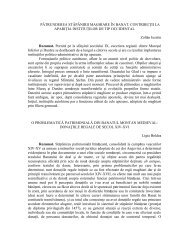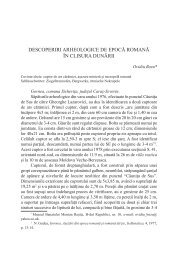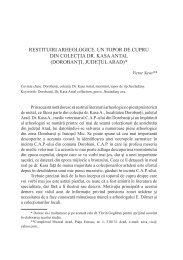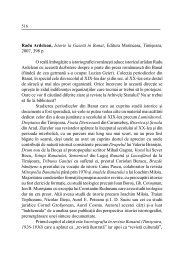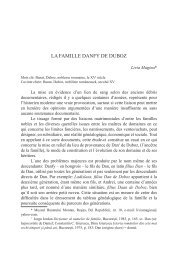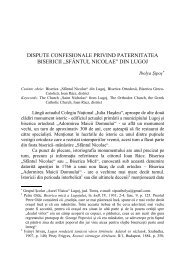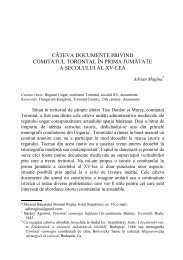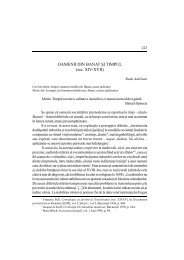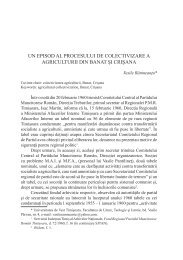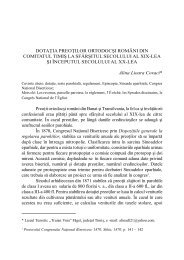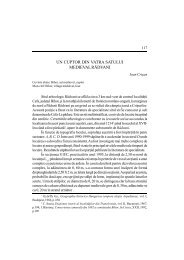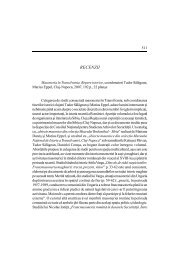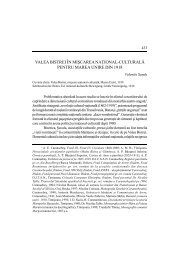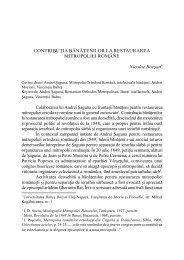Alexandru Simon - Banatica
Alexandru Simon - Banatica
Alexandru Simon - Banatica
You also want an ePaper? Increase the reach of your titles
YUMPU automatically turns print PDFs into web optimized ePapers that Google loves.
62<br />
Mamluk Egypt, allied themselves (until 1511) against Safavid Persia (the eastern<br />
recipient of most ‘crusader style’ anti-Ottoman propositions). Like the Christian<br />
powers felt that these were auspicious moments for anti-Ottoman actions (but<br />
did little in this respect), the Ottoman power, divided as it was, sensed that its<br />
Christian neighbors lacked the stamina and the attention needed to profit from<br />
the imperial crisis (and moreover the Ottoman power employed his resources<br />
to make sure that things remained that way). Emperor Maximilian’s Venetian<br />
war and the break with Julius II caused by Maximilian’s self-coronation<br />
significantly increased the Ottoman Empire’s Christian stability as well as the<br />
instability in East-Central Europe too. In spring-summer 1510, in order to further<br />
distance Hungary from the league of Cambrai, Venice promised her to pay<br />
yearly up to 60.000 ducats in exchange for her anti-Habs-burg support. More<br />
interested in settling the score with the mighty Bakócz (who was almost slain<br />
as a ‘Venetian traitor’), than in securing money for a royal budget that came<br />
short of providing for basic state necessities, the Diet refused and decided that<br />
it was time to retake Dalmatia (lost by Sigismund of Luxemburg in the early<br />
1400s) from the republic. Little Hungarian attention was given to the Ottomans,<br />
other than in propaganda words. Istanbul had been almost completely destroyed<br />
in September 1509 by an earthquake, but Hungary had been devastated by the<br />
plague and her finances were exhausted. Nevertheless, Buda played her part of<br />
Christendom’s bulwark 7 .<br />
Meanwhile, Maximilian I who had previously tried to limit his Ottoman<br />
ties in order to avoid further charges of Türkenpratiken, had contacted the<br />
sultan in the late fall of 1509. He asked Bayezid to attack Venice. Bayezid was<br />
very friendly, but made no promises. Venice was outraged by Maximilian I’s<br />
audacity. The emperor responded that the Venetians were responsible that the<br />
7 HHStA, R.H.K., Maximiliana, fasc. 14a-3, ff. 38 r -41 r ; fasc. 14b-1, ff. 37 r -39 r ; fasc. 14b-3, ff.<br />
27 r -31 r ; fasc. 15b-2, ff. 52 r , 109 r -114 r (10 th of June, 21 st of July, 31 st of October 1509, 13 th , 29 th of<br />
July 1510); fasc. 36-V.1, f. 10 r [May-June 1510; most matters were foretold by Vincenzo Querini,<br />
Venetian ambassador at Maximilian I’s court, in his report from autumn 1507: Relazioni degli<br />
Ambasciatori veneti al Senato, I-6, edited by Eugenio Albèri, Venice, 1862, p. 5-58, here p. 49-<br />
52; [Girolamo Priuli], I diarii di Girolamo Priuli [AA. 1494-1512] (=Rerum Italicarum Scriptores,<br />
NS, XXIV, 3), edited by Arturo Segre, IV, [1509-1512], Città di Castello, 1912 [1921]), col. 331;<br />
Sanudo, VII, cols. 340, 344, 346, 465; IX, cols. 563-565; Sydney N. Fisher, The Foreign Relations<br />
of Turkey (1481-1512), Urbana, Ill, 1948, p. 94-99. See Kenneth M. Setton, The Papacy and<br />
Levant (1204-1571), II, The Sixteenth Century (=Memoirs of the American Philosophical Society,<br />
CLXI), Philadelphia, 1984, III, p. 43-49, 92-95, 104-108, 121-122. A key part in Maximilian’s



